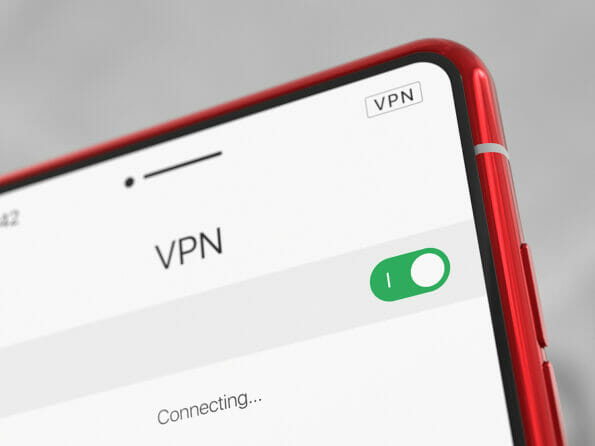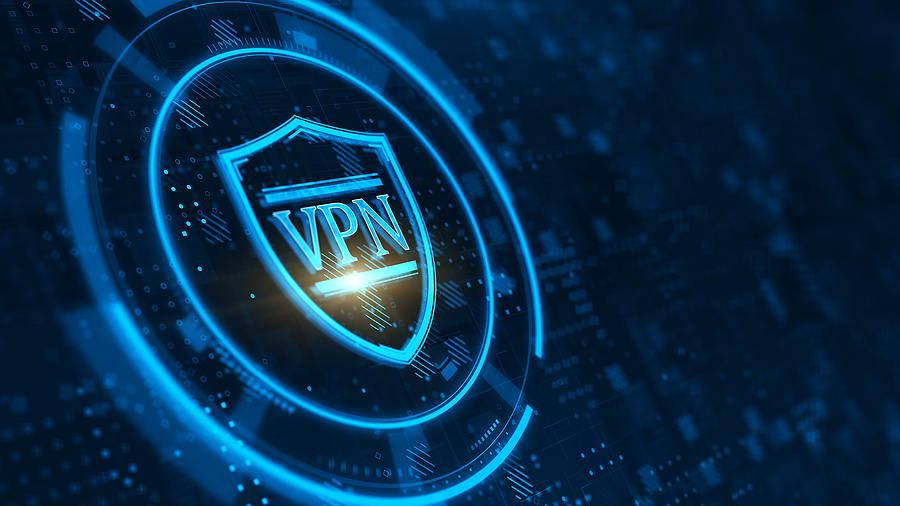A Virtual Private Network (VPN) is an essential tool for any business when it comes to staying secure online. According to Accenture, a large organization experiences an average of 22 security breaches per year, so having the best VPN for your company can help you avoid becoming the next victim. A VPN allows you to encrypt your data and secure your traffic, even when noticed by malicious actors.
A great VPN should also have features like malware protection and unlimited bandwidth so you can stay connected without worrying about sluggish connection speeds. Moreover, a quality VPN provides anonymity for your users with options for masked IP addresses to hide their true location from prying eyes. There are many more reasons for small and large companies to use VPNs, which we will discuss in this blog.
How Did VPNs Become Popular?
VPNs, or Virtual Private Networks, have emerged to provide users with a secure way to access data and software from across the globe. This type of technology was incredibly first developed in the late 90s and while it took some time to become popular, the increasing number of cyberattacks on companies has caused its demand to skyrocket. It was the activation of cybercrime that became the first impetus for the active use of VPN in life. Cybercriminal business, according to The Herjavic Group, already in 2021 amounted to about 6 trillion dollars. People are wanting more security with their online activities, making VPNs high in demand since they encode communications and allow people to browse via an anonymous IP address.
The issue of security, though important, is not the only one. Recently, regional blocking has been used more and more actively, when you cannot open a site or watch a movie just because it is not available in your country. These are 2 key reasons to use a VPN.
How Do VPN Services Work?
VPN services are virtual private networks that are used to protect personal information and increase anonymity while online. They work by creating a secure tunnel between the user’s device and the internet, which encrypts any data passing through it. VPNs also can mask an IP address, allowing users to access content that would otherwise be restricted due to geographical location or network rules. Furthermore, VPNs allow for multiple devices to connect simultaneously, making them ideal for families, and small or big businesses that need to share access to certain websites or applications. The purpose of a VPN is to provide individuals and companies with the tools necessary for preserving their privacy and security while still being able to take advantage of the many benefits of an open internet.
What Are The 12 Main Benefits of Using a VPN?
To understand why is VPN important, you need to consider the reasons for using such services. There are quite a few of them, but the key reasons are described below.
#1 Geo-Independence
While VPNs provide a great solution to access restricted content and services in places like China, businesses must consider their potential impact on data privacy since some providers log user information. Choosing a trustworthy VPN provider is essential if you have business travelers visiting countries with stricter internet regulations. You should visit this page to find a good VPN. A VPN service works worldwide, providing access to high-speed servers and providing a secure connection. There is a free version that can be downloaded from the official website and immediately try out all the benefits.
By relying on a reliable VPN service, business travelers can use the internet as they would at home, even if they are actually located in another country. Most SMBs don’t need this level of protection but this point cannot be understated for those that do. Knowing your provider’s logging and privacy policies first is the key when it comes to using a VPN to unlock new opportunities abroad.
#2 Improved Security
By deploying a VPN service to your users’ devices, you can ensure better security for accessing cloud resources and remote users alike. Whether it’s data or business apps stored in the cloud or data that travels with remote workers, a reliable VPN service can secure these activities without requiring expensive data center-grade routing hardware. Best of all, this cost-effective solution is relatively easy to set up and maintain – an attractive bonus to business owners needing secure solutions without breaking the bank. With its flexible access options and encryption capabilities, a VPN service can give businesses an added layer of security for their important operations.
#3 Secure Remote Access
Remote work is gaining massive traction in recent years, allowing businesses and individuals to be more mobile than ever before. The emergence of cloud-based applications has made it easier than ever before to work outside the office, while the pandemic has only accelerated this trend. However, with this new way of life come hackers utilizing new tactics to target vulnerable data and information. To counter these threats that may originate from any corner of the world, one must equip themselves with a reliable Virtual Private Network service.
A quality VPN establishes a secure connection between a user’s device and the server hosting their corporate data, ensuring that their asset remains safe without sacrificing usability. Given the importance of choosing the right VPN, it’s worth noting this important source. Real user reviews are the best proof of VPN reliability and stability. Moreover, collecting data logs can help identify vulnerabilities or breaches when they occur, allowing you to take immediate action whenever necessary. With a premium VPN service in play, one can enjoy greater mobility without giving up much-needed security features.
#4 Flexible
With fees often starting as low as a few dollars and pay-as-you-go subscriptions, VPN services are the kind of thing that both big and small businesses can take advantage of. Additionally, since most providers offer scalability and flexibility to their users, you can ensure that your devices remain secure as your company grows bigger. Whether you need 24/7 service after installation or updates and security patches to maintain a robust firewall, these services rarely ever disappoint. By leveraging VPN in this way, companies can rest easy knowing that their data is safe no matter how much their business grows and evolves.
#5 Encryption of Sensitive Data
Sending important information over the internet is a risky endeavor, as the data could be easily stolen by malicious actors. Banking and shopping apps use their own encryptions to combat this risk, however, these measures may not always be enough. This is where VPNs come in. Not only can they prevent anyone from accessing your data without permission, but they also have the ability to encrypt voice and video chat data so that you can take part in secure conversations and meetings without the worry of being snooped on or recorded. If online privacy and security are important to you, then investing in a VPN is well worth it.
#6 Secure Connection to Public Networks
Public Wi-Fi hotspots are undoubtedly convenient and often the only option when we’re nowhere near our home or office network. Unfortunately, their open nature means they lack the protection that our office networking systems or even home broadband offer to keep cybercriminals out. Not only can data transmitted across a public network be easily viewed, but the user is also visible to others on the same password-guarded connection. This means if a hacker is savvy enough to get their hands on the café’s password, they can be piggybacking onto your activity as well. To protect yourself from that scenario, a VPN offers encryption of your browsing data, making it unreadable and therefore less vulnerable to hackers. So if you’re connecting to unsecured open networks away from home, investing in a VPN could prevent some major headaches in the future.
#7 Low Maintenance Costs
Using a VPN can be a budget-friendly option for keeping your data secure. Setting up the network requires relatively minimal effort, with maintenance after that amounting to low costs no matter whether you’re protecting an individual’s computer or establishing cybersecurity features across an entire company. What’s more, when it comes to outfitting multiple employees with the same software, businesses only need to buy one license instead of constantly reinvesting in more versions over time – adding another value to deciding on a Virtual Private Network.
#8 Multiplatform
With smartphones becoming increasingly ubiquitous, it’s no surprise that they’re the go-to device for internet access on the move. This means it’s extra important to protect yourself and your activities by using a VPN on your phone as well as any other devices connected to the internet. The best practice is to choose a reliable, paid VPN service that offers multiple simultaneous connections, allowing you to encrypt all your devices at the same time; from laptops and PCs to tablets and smart TVs. Not only that, but some good VPN services will allow you to set up protections for an entire network in one place- meaning that you won’t even have to remember to connect each device individually. Bottom line: If ultimate privacy and security are your goal across multiple devices then having a paid VPN is a must.
#9 Access Control
Access control is the practice of controlling who or what gets access to specific resources. It can help to protect a network from malicious actors and unwanted intrusion. VPNs are one method of providing access control, as they can authenticate and authorize users by going through Identification, Authentication, and Authorization processes. The danger with access control is giving more than necessary – it’s important to remember that only the people who need access should be given it. Reliable VPN services provide administrators with the means to do so, ensuring proper management for a secure network environment.
#10 Easy to Turn On And Off
Unlike many other services, VPNs are easy to turn on and off, allowing users to enjoy safe browsing whenever they need it. You don’t have to worry about connecting directly through your usual internet provider; all you have to do is activate the VPN protection and your information will remain private while you’re surfing online. Plus, studies show that turning on a VPN can actually increase your internet speed depending on where you live. With no hassle or time wasted setting up before, there’s no reason not to get started with an excellent VPN service today. As soon as the need for a VPN disappears, for example, you switch to a home network, you can turn off the service in a couple of clicks.
#11 Anonymity
Anonymity on the internet can be difficult to achieve, and often requires taking significant steps to protect yourself. With a VPN provider though, it is much simpler. By browsing the web through the VPN’s IP address or addresses, you can enjoy a safe and secure way of accessing the content you need – free from possible data-collection hacks. Unlike your static IP address, this unique IP address provided by the VPN will change frequently, so that any malicious attempts to trace your online activity will be less successful, allowing you to move about online with peace of mind.
#12 Network Performance
When it comes to network performance, using a VPN is the way to go. VPNs provide both bandwidth and improved efficiency for businesses, making sure that traffic is not being throttled by Internet Service Providers (ISPs). Thanks to data compression technology, the user needs to wait less time for the content to be downloaded. Yes, and network latency can be significantly reduced, but this will largely depend on the location of the selected server. The further the server is, the higher the ping will be, and vice versa.
Are VPNs Worth The Money?
Investing in a VPN might feel like an unnecessary expense, especially when your business is cutting costs. However, a data breach can be much more costly than the price of a VPN. Hiscox, an insurance carrier, claims businesses are losing up to $200,000 on average when faced with one. Instead of risking such losses, taking even the smallest precautionary steps will keep your business secure and stable.

A Virtual Private Network (VPN) is a great way to ensure the safety of your servers and data. Contrary to popular belief, it doesn’t require major investments or IT budgets. Cloud-based services are available for installation and setup without any lengthy processes from you or your team. With a VPN, you won’t have to worry about not being able to manage online activities anymore – privacy and control come free of cost.
Final Thoughts
Ultimately, the use of a Virtual Private Network is now more important than ever in today’s digital landscape. Whether you’re a business or an individual, having and using a VPN can provide security and peace of mind when browsing and sending information online. However, it is important to ensure that the VPN service you are using is trustworthy and secure, as not all providers are the same. Those services that use a no-logs policy, strong encryption, and kill switch technology, as a rule, are more reliable and interesting to use in a commercial environment. Investing in quality VPN protection for yourself or your business could be an invaluable tool for the future, protecting both your data and privacy from unwanted intrusions.
Image Source: BigStockPhoto.com (Licensed)
Site Disclaimer
The Content in this post and on this site is for informational and entertainment purposes only. You should not construe any such information or other material as legal, tax, investment, financial, or other advice. Nothing contained on our Site constitutes a solicitation, recommendation, endorsement, or offer by HII or any third party service provider to buy or sell any securities or other financial instruments.
Nothing in this post or on this site constitutes professional and/or financial advice. You alone assume the sole responsibility of evaluating the merits and risks associated with the use of any information or other content in this post or on this site.
You recognize that when making investments, an investor may get back less than the amount invested. Information on past performance, where given, is not necessarily a guide to future performance.
Related Categories: Work, Reviews, Tech





